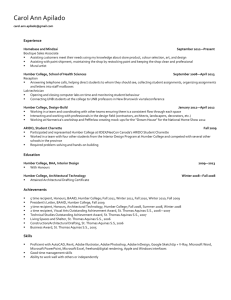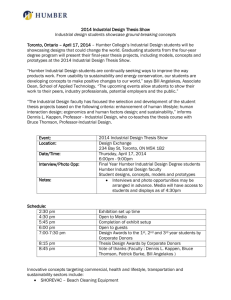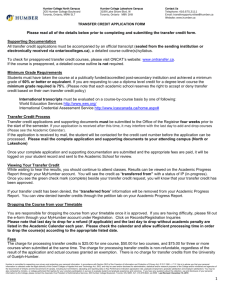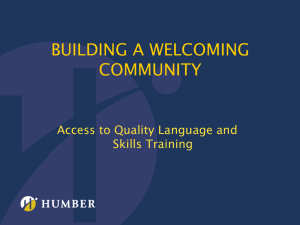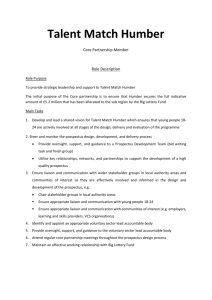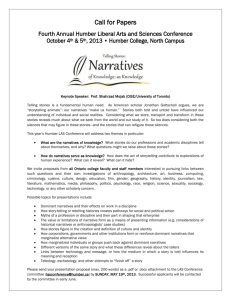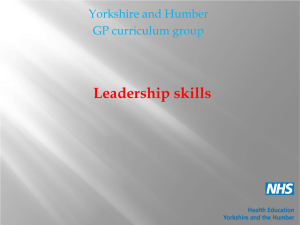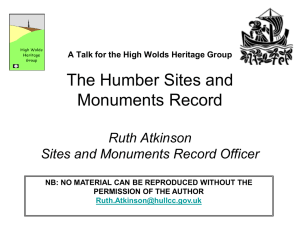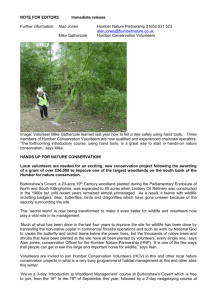COURSE OUTLINE ACADEMIC YEAR 2015
advertisement
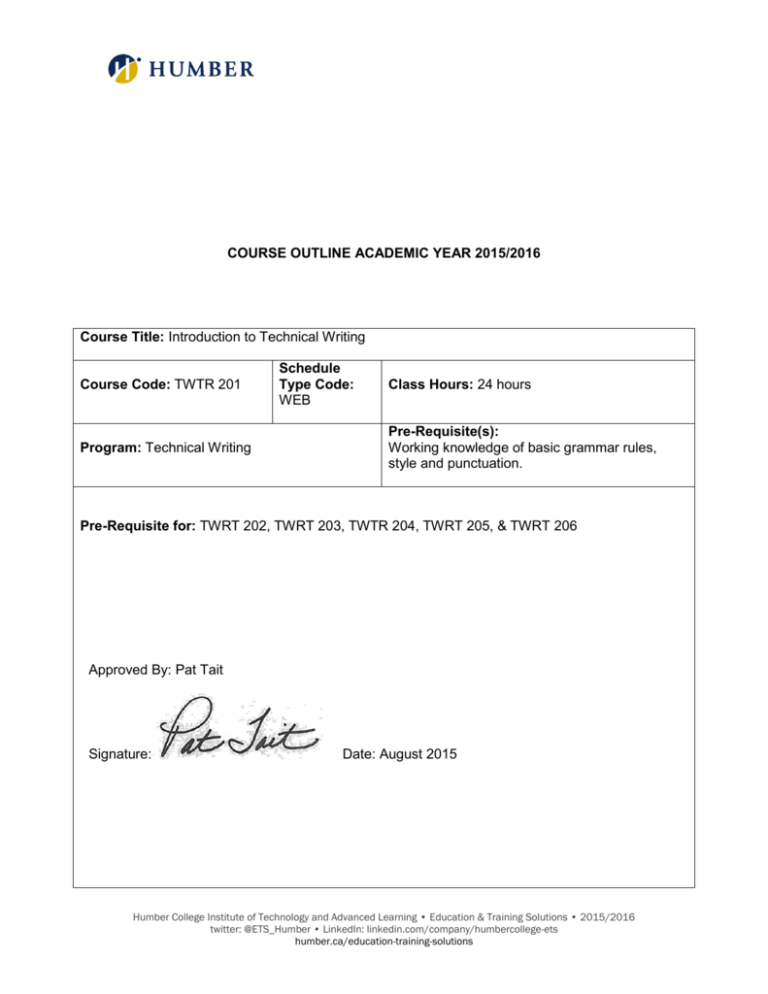
COURSE OUTLINE ACADEMIC YEAR 2015/2016 Course Title: Introduction to Technical Writing Course Code: TWTR 201 Program: Technical Writing Schedule Type Code: WEB Class Hours: 24 hours Pre-Requisite(s): Working knowledge of basic grammar rules, style and punctuation. Pre-Requisite for: TWRT 202, TWRT 203, TWTR 204, TWRT 205, & TWRT 206 Approved By: Pat Tait Signature: Date: August 2015 Humber College Institute of Technology and Advanced Learning • Education & Training Solutions • 2015/2016 twitter: @ETS_Humber • LinkedIn: linkedin.com/company/humbercollege-ets humber.ca/education-training-solutions Course Description This course provides the fundamental skills required to be a technical writer. You will practice using the various on-the-job techniques such as audience and a task analysis; learn about effective interview techniques to assist you in information gathering; and discover how to write well-constructed procedures that conform to industry standards. Be able to differentiate between procedural, task, concept, and overview information, as well as organize content so that it meets your user’s needs. Learning Outcomes Upon successful completion of this course, students will be able to: 1. Determine appropriate goals and objectives for a documentation project. 2. Match the needs of basic audience types to different document characteristics. 3. Organize the primary message according to purpose and select the essential content. 4. Employ the appropriate style, tone, and vocabulary to a technical document. 5. Build a Table of Contents to outline the contents for a document. 6. Know and apply the structure of an effective user manual for print. 7. Identify various sources for gathering information. 8. Plan and conduct an effective interview then organize the information collected. 9. Write an introduction and closing to a chapter. 10. Produce procedural and reference information to fill the outline of a chapter. 11. Produce introductions, explanations, transitions and closing information to unify a chapter. 12. Select the most appropriate type of graphic to illustrate content. 13. Lay out a document and page design according to industry standards. Essential Employability Skills Essential Employability Skills are transferable skills that provide the foundation for a student’s academic, vocational, and personal success. Communication: Organize the instructional message according to purpose. Select only the content that is necessary to convey the message. Apply aural, linguistic and visual conventions of rhetoric. Employ a style, tone, and vocabulary that suits the message, situation, and intended audience. Listening: Follow directions. Ask appropriate questions to clarify meaning. Interpret and accurately restate or summarize spoken messages. Control internal and external elements that may cause interference. Resource Management: Identify and use resources effectively for personal and workrelated goals. Use various learning strategies to accomplish educational goals. Work within time frames and meet deadlines. Use expertise appropriately. Humber College Institute of Technology and Advanced Learning • Education & Training Solutions • 2015/2016 twitter: @ETS_Humber • LinkedIn: linkedin.com/company/humbercollege-ets humber.ca/education-training-solutions Learning Resources The Microsoft Manual of Style - Fourth Edition Publisher: Microsoft Press ISBN: 978-0-7356-4871-5 Textbook available through online vendors such as Amazon.ca in print or eBook format. Other articles and resources are downloadable in the course. Learning Delivery Format Online. Chat sessions are held once a week at 7:00pm for an hour approximately. Course Content UNIT TOPIC(S) OBJECTIVES 1. Audience analysis Define technical writing and explain its application Match audience needs to document characteristics Differentiate business from usability goals 2. User-task Analysis Define and describe functions, processes and tasks Practice building a matrix based on user tasks Format different page elements using styles 3. Research and interviewing Gather the information needed for a typical project Discuss how to work with subject matter experts Convert a task matrix into a table of contents 4. Procedures and Organization Write effective, well-constructed procedures Review the elements of technical style Apply the principles of good writing 5. Building the User Guide Convey conceptual and overview information Build, edit and evaluate the elements of a glossary Build, edit and evaluate the elements of an index 6. Document Design Design a strong page layout to suit the content Create, edit, and place graphics and tables effectively Combine fonts following common design principles 7. Beyond the User Guide Modify content for online applications Address localization and globalization issues Test for accessibility (AODA, Section 508, WAG) 8. The Technical Communication Profession Understand current job opportunities Appreciate the skills employers are looking Review next steps in the certificate program Humber College Institute of Technology and Advanced Learning • Education & Training Solutions • 2015/2016 twitter: @ETS_Humber • LinkedIn: linkedin.com/company/humbercollege-ets humber.ca/education-training-solutions Please note: this course schedule may change as resources and circumstances require. Student Evaluations Assignments: 1 – Audience Analysis 2 – Task Matrix 3 – Document Outline 4 – Sample User Guide Chapter 5 – Research Topic Discussion Quizzes Live Chats 8 10 10 40 10 8 6 8 Total Marks = 100% Minimum grade of 60% is required to pass the course. Copyright Copyright is the exclusive legal right given to a creator to reproduce, publish, sell or distribute his/her work. All members of the Humber community are required to comply with Canadian copyright law which governs the reproduction, use and distribution of copyrighted materials. This means that the copying, use and distribution of copyright- protected materials, regardless of format, is subject to certain limits and restrictions. For example, photocopying or scanning an entire textbook is not allowed, nor is distributing a scanned book. See the Humber Libraries website (http://library.humber.ca) for additional information regarding copyright and for details on allowable limits. Tests and Assignments Assignments must be submitted on or before the "due date", as directed by the instructor. Late submissions, without valid reasons (such as illness or emergency) or without prior arrangement may be penalized by the instructor, normally at 10% per day, or as announced by the instructor. Days of lateness will include weekends and holidays. If for valid reasons, an assignment/evaluation cannot be completed on time, then a reasonable penalty-free time extension may be given by the instructor. Claims of illness or other emergencies may have to be documented, if required by the instructor or the administration. Advanced notice by email is required if you are going to miss a test and supporting documentation must be submitted. If you miss a test without prior notice due to illness or some emergency, you must provide the reason in writing to the instructor within 3 days of the missed test. If your reason is accepted by the instructor and the college, arrangements will be made for you to write the test. Grade Report, Transcript, and Certificate Upon completion of a course, student access to grades can be obtained online by logging onto Humber College Institute of Technology and Advanced Learning • Education & Training Solutions • 2015/2016 twitter: @ETS_Humber • LinkedIn: linkedin.com/company/humbercollege-ets humber.ca/education-training-solutions the Myhumber website at www.humber.ca/myhumber using the Humber issued username and password. For assistance logging in or for a password reset, visit www.its.humber.ca. Policies and Procedures It is the student’s responsibility to be aware of the College Academic Regulations which can be found on the following website: http://www.humber.ca/academic-regulations Academic Integrity Academic integrity is essentially honesty in all academic endeavors. Academic integrity requires that students avoid all forms of academic misconduct or dishonesty, including plagiarism, cheating on tests or exams or any misrepresentation of academic accomplishment. Academic Concern/Appeals If a student has questions or concerns regarding a grade on an assignment or test, the student should discuss the matter with the faculty member. The Program Co-ordinator and/or the Associate Dean may be asked to assist if the faculty member and student are unable to resolve issues. Students may request an individual piece of work or the final course grade to be reviewed within ten (10) business days of receiving the graded evaluation. Complete details regarding academic appeals are found in the College’s Admission Requirements & Academic Regulations at www.humber.ca/academic-regulations Disability Services Humber seeks to create a welcoming environment where equity, diversity and safety of all groups are fundamental. Humber is dedicated to providing equal access to students with disabilities. The Disability Services staff are available by appointment to assess specific needs, provide referrals and arrange appropriate accommodations. If you require academic accommodations, contact: Disability Services: http://www.humber.ca/disabilityservices/ North Campus: (416) 675-6622 X5180 Lakeshore Campus: (416) 675-6622 X3265 Disclaimer While every effort is made by the professor/faculty to cover all material listed in the outline, the order, content, and/or evaluation may change in the event of special circumstances (e.g. time constraints due to inclement weather, sickness, college closure, technology/equipment problems or changes, etc.). In any such case, students will be given appropriate notification in writing, with approval from the Dean (or designate) of the School. Humber College Institute of Technology and Advanced Learning • Education & Training Solutions • 2015/2016 twitter: @ETS_Humber • LinkedIn: linkedin.com/company/humbercollege-ets humber.ca/education-training-solutions
